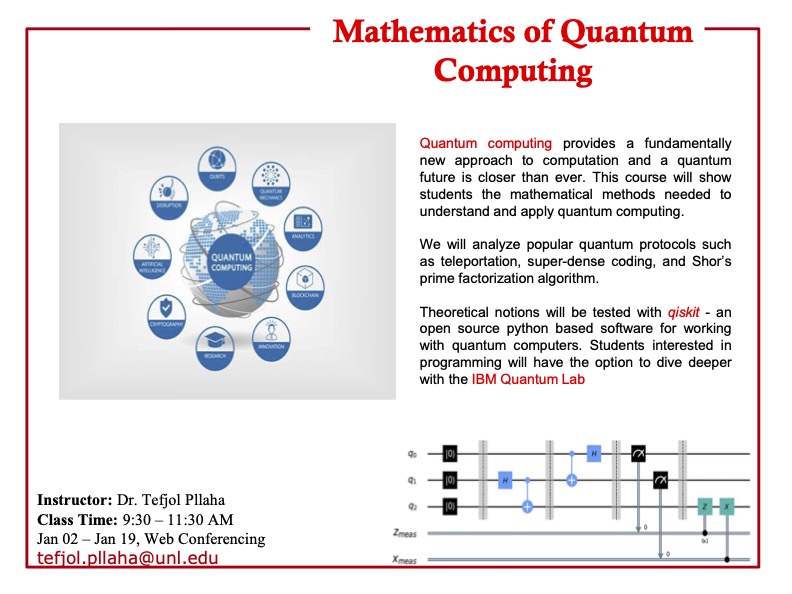
Nebraska Experimental Math and Outreach (NEMO) Lab
Are you ready to dive into the fascinating world of Quantum Computing? The newly created Nebraska Experimental Math and Outreach (NEMO) Lab of the UNL Math Department is thrilled to invite passionate undergraduate students to join an exciting project in Quantum Computing in the Spring of 2024 (January 29- April 30)! The goal of this project is to familiarize a small group of students with applications of quantum computing. Students of all majors are welcome. Participation in this project is eligible for experiential learning credit.
What to Expect:
• Cutting-edge knowledge: Learn about quantum science, a topic which brings together math, physics, computer science, and engineering, and has the potential to shape the future of technology.
• Hands-on experience: Dive into experimental quantum computing projects; an option will be available for programming a quantum computer using Ksit and IBM Quantum Labs.
• Collaboration: Engage with a brilliant team of students and mentors, fostering an environment of collaboration and shared knowledge.
• Experiential Learning credit: students who participate in this project will be eligible to register for a 0-credit course, CASC 98, which satisfies the College of Arts and Sciences experiential learning requirement.
Apply to be part of the quantum computing project by sending an email to Prof. Alexandra Seceleanu (aseceleanu@unl.edu) by December 1, 2023, including information on your academic background and courses taken at UNL.
MATH 391 Section PW2: Mathematics of Quantum Computing
Spring 2024 Pre-Session Course
Dr. Tefjol Pllaha will be teaching MATH 391 Section PW2: Mathematics of Quantum Computing during the Spring 2024 Pre-Session. This 2 credit hour course will count has an Advanced Math course for the Math major or minor. Quantum computing provides a fundamentally new approach to computation and a quantum future is closer than ever. This course will show students the mathematical methods needed to understand and apply quantum computing. We will analyze popular quantum protocols such as teleportation, super-dense coding, and Shor’s prime factorization algorithm. Theoretical notions will be tested with qiskit - an open source python based software for working with quantum computers. Students interested in programming will have the option to dive deeper with the IBM Quantum Lab.
Class Time: 9:30–11:30 AM
Jan. 2–19, Web Conferencing
Please contact Dr. Pllaha at tefjol.pllaha@unl.edu if you have questions!